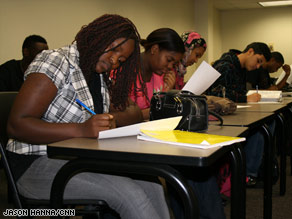Anyone who's ever seen Jay Leno do one of his "Jaywalking" segments on NBC, locating average Americans and asking them factual questions on street corners, knows there are far too many Americans who know next to nothing about just about everything. They can't name our first president or don't even know what the phrase "Founding Fathers" means. Ask them to name our current vice president and watch the brain waves flat line.
Newsweek magazine recently announced its disgust after it offered the government's official citizenship test (the one we require immigrants to pass before being naturalized) to 1,000 Americans. Thirty-eight percent of the sample failed. Newsweek worried in its headline: "The country's future is imperiled by our ignorance."
The magazine was careful enough to report that civic ignorance isn't new. One study found the yearly shifts in civic knowledge since World War II have averaged out to "slightly under 1 percent." But it worried that today's interconnected world is "becoming more and more inhospitable to incurious know-nothings — like us."
It's easy to get discouraged with the results. Sixty-five percent couldn't figure out that the Constitution was penned and adopted at the Constitutional Convention; 63 couldn't identify how many justices were on the Supreme Court (nine); and 73 percent couldn't identify that communism was what we opposed in the Cold War.
Current national leaders aren't so well known: 29 percent could not identify the current vice president (Joe Biden) and twice that percentage didn't identify the Speaker of the House (John Boehner).
Let's start with the positive angle here. It's a terrific idea to examine whether native-born citizens can pass the citizenship test and an astonishing embarrassment to learn how many can't. Some public schools have used the citizenship test as a social-studies project in civic knowledge. A daring principal could make passage of the citizenship test a high-school graduation requirement. Promoting better civic and historical knowledge is an important cause.
But this leads to a follow-up question for Newsweek and its media colleagues: Do journalists see building civic knowledge as an important part of their job?
A few years ago, when pollsters asked Americans to name two of Snow White's Seven Dwarfs and two of the nine U.S. SupremeCourt justices, 77 percent of Americans polled were able to identify two dwarfs, while only 24 percent could name two Supreme Court justices.
justices, 77 percent of Americans polled were able to identify two dwarfs, while only 24 percent could name two Supreme Court justices.
But how often are the justices discussed on news programs, where ostensibly, Americans receive their civic education? A quick Nexis search for Justice Ruth Bader Ginsburg, to take one example, finds her mentioned less than once a month each on ABC, CBS and NBC morning and evening newscasts in 2010: 10 on ABC, eight on NBC, six on CBS. That's just mentions, not stories.
Or take "communism." The word was mentioned just 19 times on the Big Three morning and evening newscasts in 2010 (eight on ABC, seven on CBS, four on NBC). That's despite Communist parties still ruling China, North Korea and Cuba, among others.
Perhaps the news media think they don't have time or space to waste on high-school basics about civics. Newsweek turns to liberal experts to find agreeable culprits for civic ignorance, such as "our reliance on market-driven programming rather than public broadcasting," which would "foster greater knowledge" than commercial news.
But guess what? Playing our Nexis game, Ginsburg was only mentioned six times and the word communism was only mentioned seven times on "PBS NewsHour" in all of 2010. Someone wouldn't necessarily get a better test score from Jim Lehrer than from Katie Couric.
The liberals at Newsweek also blamed America's decentralized or federalist system of government. We have civic ignorance, they report, since unlike Europeans and their majority-rule parliamentary systems, Americans have to contend with voting for "subnational" officials. Likewise, American schools are "decentralized" and managed by states, without a central national curriculum.
How ironic that Newsweek would find Americans ignorant for not knowing the authors of the Federalist Papers even as they blame federalism for our civic stupidity.
Naturally, the magazine also blamed America for having "one of the highest levels of income inequality in the developed world, with the top 400 households raking in more money than the bottom 60 percent combined." Those darn successful people. So if we more aggressively redistributed wealth, Newsweek suggests, more people would know who the vice president is.
There are more direct culprits that could correct this ignorance: teachers, parents and, yes, journalists, for not emphasizing this "rote knowledge" of the facts around which we organize our government and remember our history.
By the way, Newsweek only mentioned Ginsburg three times in 2010.
By L. Brent Bozell III is the president of the Media Research Center. To find out more about Brent Bozell III, and read features by other Creators Syndicate writers and cartoonists, visit the Creators Syndicate Web page at www.creators.com.
Education and the value on education in America is at an all time low. Add to this the purposeful dumbing down of America by the Progressive Movement which includes brainwashing our children, re-writing history and textbooks, Political Correctness and the co-opting of religion using social justice. America will only survive as the same country we grew up in if parents stand-up and get involved in the education of their children and if Americans themselves re-educate themselves in history and current events and then share what they learn with others.
